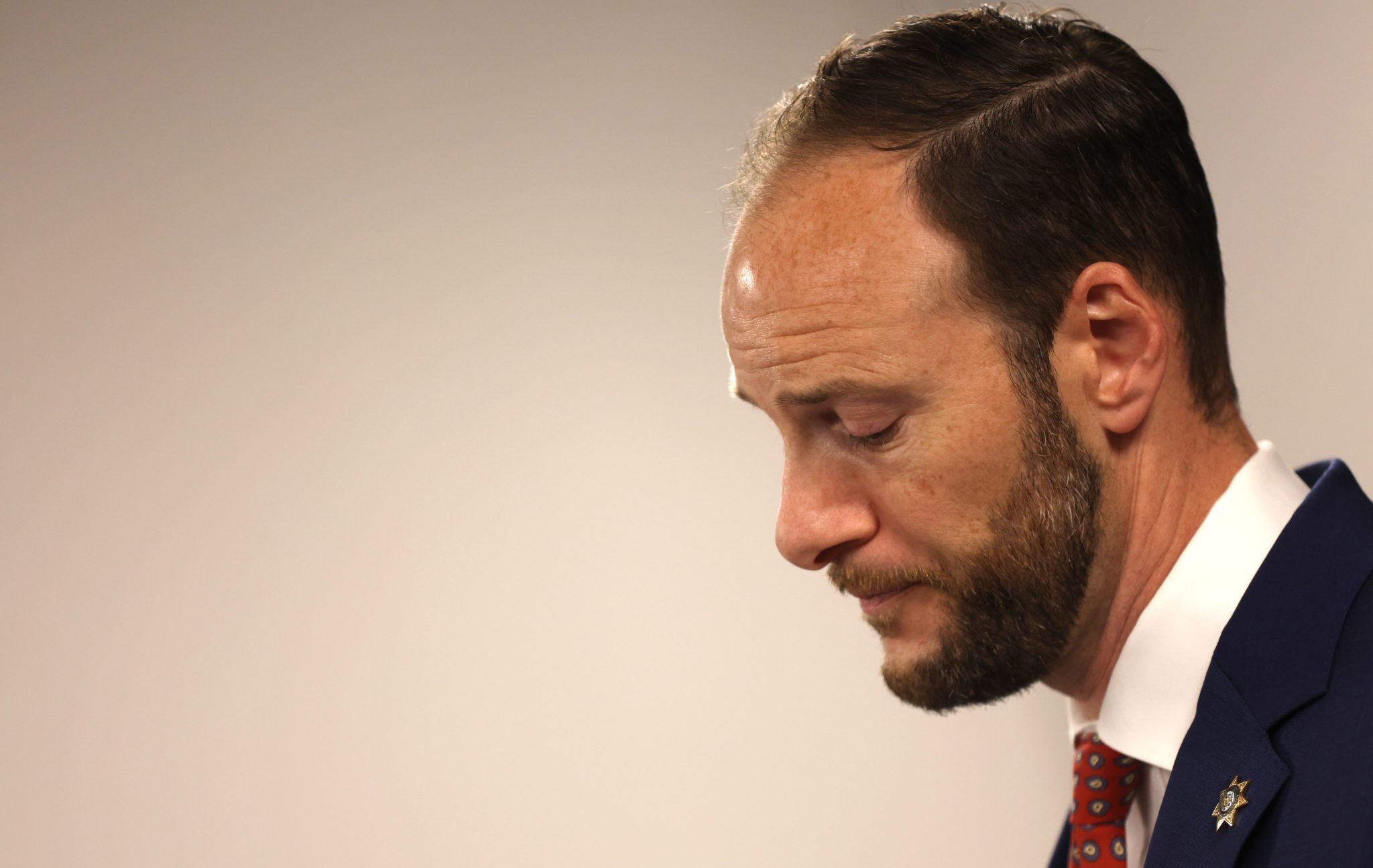Progressive prosecutors are leading their cities and states into unconstitutional waters.
San Francisco District Attorney Chesa Boudin looks on during a news conference on May 10, 2022. (Photo by Justin Sullivan/Getty Images)
“Republicans, the police union, and the ultra-wealthy are banding together” to recall San Francisco District Attorney Chesa Boudin according to the pro-Boudin group Stand With Chesa. I don’t fit into any of those categories, nor do a lot of the San Franciscans looking to dismiss Boudin for failing to enforce the law. This recall effort raises a question that San Francisco voters, as well as voters across California and the nation at large, will have to settle. When prosecutors like Boudin refuse to enforce the law in defiance of their constitutional duties, will they be held accountable?
Here in California, Governor Gavin Newsom and Attorney General Rob Bonta have fallen short of their constitutional duties by allowing prosecutors to wield undue discretion over the enforcement of the law. The California constitution obligates the attorney general “to see that the laws of the State are uniformly and adequately enforced.” The governor has the responsibility to “see that the law is faithfully executed.” In the words of Zachary Price, a professor at the U.C. Hastings College of Law, “These provisions are at odds with presuming any categorical nonenforcement power at all, let alone one vested in locally elected officials.” Yet, neither Newsom nor Bonta have stepped in to prevent prosecutors across the state from explicitly or implicitly refusing to enforce certain laws. They’re not alone in failing to rein in lawless prosecutors.
Arkansas, Hawaii, Indiana, Maryland, Massachusetts, Nebraska, New Hampshire, North Carolina, Oregon, Virginia, Vermont, and West Virginia all have constitutions that, per Price, ban suspensions of law enforcement. Florida and New Jersey, like California, charge state-level officials with an affirmative duty to ensure enforcement of the law. In cities across these states, progressive prosecutors have tried to respond to understandable calls for criminal-justice reform. In doing so, however, these prosecutors are leading their respective states into unconstitutional territory. California serves as a useful example.
Given that the people of California established the state constitution and that constitutional provisions supersede those of municipalities, Californians deserve to have a governor and attorney general who faithfully execute the existing law unless and until the people decide otherwise by amending their Constitution. No prosecutor possesses the power to take the law into his hands and unilaterally decide that certain crimes are unworthy of enforcement.
Yet, the district attorney in Los Angeles, George Gascón, has stated that his office will not prosecute certain crimes. Upon taking office, Gascon told his prosecutors to decline charging 13 categories of low-level misdemeanors, including driving on a suspended license and public intoxication. This action flew in the face of the governor and attorney general’s constitutional mandates to enforce the law. However, Newsom and Bonta have sat on the sidelines and enabled power grabs by prosecutors.
Similarly, in San Francisco, District Attorney Boudin has effectively written some laws of the books. His team dismissed 50 percent of cases of illegal gun possession from 2020 to 2022. Likewise, of 131 arrests for felony domestic violence made by the San Francisco Police Department at the end of 2020, the D.A. sought prosecution in only 13 cases. This lack of enforcement aligns with Boudin’s preferences. His own staff admit that Boudin “has a radical approach that involves not charging crime in the first place and simply releasing individuals with no rehabilitation and putting them in positions where they are simply more likely to reoffend.” Again, Newsom and Bonta have not intervened to thwart these practices.
Despite their frustration, other actors in the criminal-justice system do not have the capacity to correct a D.A.’s lack of enforcement. One judge chastised Boudin’s office for moving to dismiss a case in which competent prosecution could have occurred. Other judges, lacking the power to force prosecution, have simply followed the D.A.’s wishes by dismissing cases that Boudin refused to advance.
Local voters in cities across California may not like certain laws. Many California voters believe some state laws are antiquated, excessively enforced, or resulted in the disproportionate incarceration of poor and minority Californians. Those are understandable positions to hold, and the voters who hold them have recourse to the legislature. What is not okay is permitting local prosecutors to exercise unconstitutional discretion in enforcement.
Californians can and should work through the state legislature to remove outdated and unjust laws. But until those laws are removed from the books or the constitution is amended to afford prosecutors greater authority over enforcement decisions, the governor and attorney general have an obligation to the people of California to ensure the same laws apply in every corner of the state.
It is true that legislative fixes and amendments to the Constitution take time and energy. But, that is how democracy in California and many other states is designed. Procedural steps cannot be skipped and the state constitution violated merely because the legislative process is difficult.
Newsom and Bonta and the equivalent officials in other states do not want to appear to be the “bad cops” forcing prosecutors to faithfully enforce the law. But they don’t get to skip that part of their job description. They cannot be allowed to shirk their constitutional obligations.
If Newsom, Bonta, Boudin, or others want to write laws off the books, they should go through the appropriate channels. It is disingenuous when people like Boudin pretend that support for the uniform application of the law is a partisan stance. You don’t have to be a Republican, a police officer, or a rich person to want legal reforms to be made via the legislature rather than through the unchecked discretion of local officials.
Kevin Frazier is a fellow at the Miller Institute for Global Challenges and the Law at the U.C. Berkeley School of Law.

